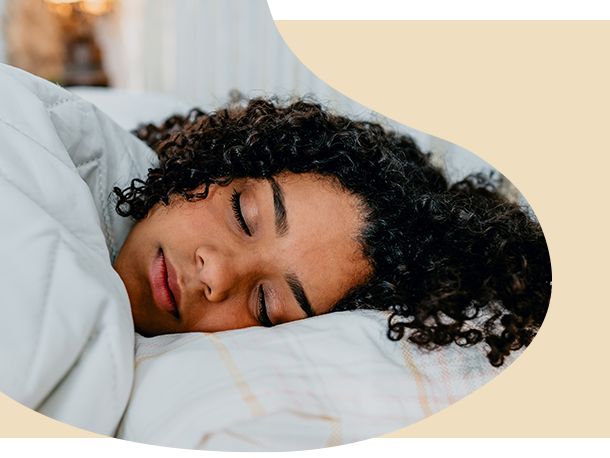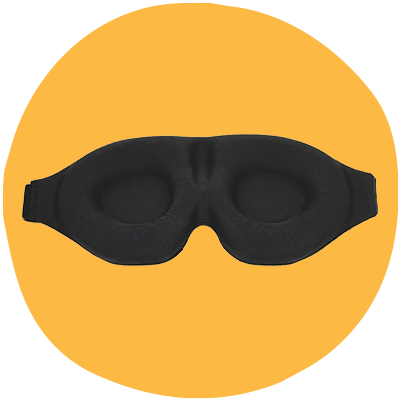| |  | | | | Can you really eye-roll yourself back to sleep? | | I came across this technique on TikTok. Perhaps the algorithm had somehow detected that I'd been waking up in the middle of the night and strugged to get back to sleep, but I was soon able to test it. | | In the darkness, I scrunched my eyes closed, went through the moves a couple of times … and that's all I remember before waking up from dream-filled sleep, revived, refreshed, and ready to start my day. | | It's not impossible that I would have fallen asleep again without any eye rolling, but its apparent effectiveness motivated me to share it with you today. | | This technique had already been circulating on Instagram after Dr. Katelyn Tondo-Steele, a surgeon, shared her experience, claiming it had been successful in 14 out of 15 attempts. Neuroscientist Andrew Huberman also discussed a simplified version with side-to-side movements and closed eyes as part of his sleep optimization toolkit. | | Is there any actual science here, or are we all just willing to believe that a few eye movements can solve one of life's most persistent and exhausting irritations? | | What the research actually shows | | Dr. Tondo-Steele herself openly admits that there are no scientific studies specifically examining this exact eye movement pattern for sleep. Even without definitive research on this specific technique, we can piece together why it might work for some people. | | 👁️ Eye movements and the nervous system: Slow, deliberate eye movements are linked to activation of part of the autonomic nervous system that promotes relaxation rather than alertness. A 2021 study of patients with advanced lung cancer found that structured eye movement training significantly improved sleep quality, reduced negative emotions, and lowered pain scores. The training involved systematic eye exercises, though the specific patterns differed from the eye roll hack. | | ⚡ The attention factor: A simpler explanation is that the eye movements redirect your attention away from any racing thoughts that keep you awake. Eye movements may suppress activity in the amygdala, the brain's alarm system, making people feel calmer and less fearful. Providing the mind with something repetitive and boring (yet engaging enough to prevent rumination) to do may increase the likelihood of sleep. | | 🧠 Conditioning and expectation: If you believe it will work, you become more relaxed about falling back asleep, which makes it more likely to happen. The placebo effect is real, and it's easy to see how it could apply in the case of sleep. | | 💤 Simple eye fatigue: The movements themselves may create a mild sense of eye fatigue. I find the sensation of my eyes moving under their lids to be pretty unpleasant and unnatural, and in my case, this overrides any fatigue, because two cycles is plenty. | | Some social media posts suggest that "mimicking REM sleep" is the secret ingredient. However, the eye movements during actual REM sleep are rapid, involuntary, and associated with dreaming. Tricking your brain into REM sleep by consciously moving your eyes slowly with intention — that's unlikely to be what's happening here. | | Should you try it? | | Well, it costs nothing, requires minimal effort, has no side effects, and with enough people reporting success, it may be worth a try. As Dr. Tondo-Steele puts it, this is "a very low risk, high-reward hack." However, it's not a substitute for addressing any underlying sleep disorders, chronic insomnia, or the lifestyle factors that contribute to poor sleep. | | If you regularly struggle to fall back asleep after waking or if your sleep problems affect your daytime function, this eye movement hack is a valuable addition to proper sleep hygiene and, when necessary, professional help. Not a replacement. | | | | | | | | | | | The eyes have it | | | | | | |  | | Our Reviewer Tried 8 Sleep Masks. Only 2 Made the Cut | | A sleep mask is an affordable, effective way to control your sleep and, arguably, your health. Healthline editor Catherine Connelly tried eight different options, and two stood out. One for its value and soft, cool material; the other because its silk felt luxurious, covering her ears and staying put all night long. As Catherine says, "everyone can agree that sleep rules. A good sleep mask makes it even better." | | | Every product we recommend has gone through either Healthline's or Optum Now's vetting processes. If you buy through links on this page, we may receive a small commission or other tangible benefit. Healthline has sole editorial control over this newsletter. Potential uses for the products listed here are not health claims made by the manufacturers. Healthline and Optum Now are owned by RVO Health. | | | | | | | | | | | |   | | | | | | | | Until next time, |  | Take care of yourself, and we'll see
you again soon! | | |  | | |  | | This edition was powered by | | working in a café for a change. | | | | | | | | View in browser
Did a friend send you this email? Subscribe here.
To see all newsletters, click here.
Privacy | Unsubscribe
We may feature your messages to our inbox within our content. Please do not provide any personal identifiable information. Replies may be edited for length and clarity. For more, see our Privacy Policy.
Our website services, content, and products are for informational purposes only. Healthline does not provide medical advice, diagnosis, or treatment and should not be used as a substitute for medical advice from a healthcare professional. Healthline encourages you to make any treatment decisions with your healthcare professional.
Every product we recommend has gone through either Healthline's or Optum Now's vetting processes. If you buy through links on this page, we may receive a small commission or other tangible benefit. Healthline has sole editorial control over this newsletter. Potential uses for the products listed here are not health claims made by the manufacturers. Healthline and Optum Now are owned by RVO Health.
© 2025 RVO Health
1101 Red Ventures Drive
Fort Mill, SC 29707 | | | | |   | | |
TikTok trend or legitimate science? ͏ ͏ ͏ ͏ ͏ ͏ ͏ ͏ ͏ ͏ ...

-
Plus: Kicking off Pride Month with the new Goodnewspaper and more good news to celebrate! ...
-
Parents face new rules on childhood shots, while COVID vaccine access becomes more limited. ...
-
And nontoxic shampoos we've tried and loved ͏ ͏ ͏ ͏ ͏ ͏ ͏ ͏ ͏ ͏ ͏ ͏ ͏ ...
| |
Nema komentara:
Objavi komentar